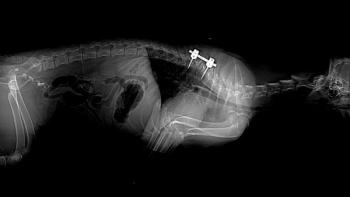
Are melatonin levels associated with seizures in dogs?
The hormone reportedly has anticonvulsant effects in people.
gumichan/stock.adobe.com
Why they did it
The aim of this collaborative study, conducted by the Purdue University and Washington State University Colleges of Veterinary Medicine, was to determine whether serum melatonin concentrations were different in healthy dogs versus dogs with seizures. Based on evidence from laboratory animals, melatonin may have an anticonvulsant effect and alter the threshold at which seizures may occur. In addition to regulating circadian rhythms, melatonin also influences the activity of neurotransmitters by increasing brain gamma-aminobutyric acid concentrations and reducing the excitatory effect of N-methyl-D-aspartate. The hypothesis in this study was that dogs with seizures would have lower serum melatonin concentrations than healthy dogs.
What they did
Serum melatonin concentrations were evaluated in 29 healthy dogs and 33 dogs with seizures. During the sampling period, lighting was not controlled and dogs were exposed to normal ambient light. Once collected, blood samples were shielded from light and frozen until the radioimmunoassay was performed. Melatonin concentrations between the two groups were analyzed for differences.
What they found
Melatonin concentrations were above the minimum detectable limit (³0.5 pg/mL) for at least one of the three time points in nine of 29 healthy dogs and eight of 33 dogs with seizures. Of those dogs, mean melatonin concentrations of the healthy dogs were 1.22, 0.72, and 0.85 pg/mL at 8:00 am, 12:00 pm and 4:00 pm, respectively. At the same time points, mean melatonin concentrations in the dogs with seizures were 1.09, 0.96, and 0.79. Statistically, there were no significant differences between the two groups, and no significant differences between time points. There was also no significant difference in those dogs receiving anticonvulsant medications versus those that were not, or the type of anticonvulsant administered.
Take-home points
Based on this study, the use of melatonin to control seizure activity in dogs is not supported. For those samples that were above the detectable limit of the assay, serum melatonin concentrations were not significantly different between dogs with seizures and those without. Although there exists a pathophysiologic rationale for melatonin having a role in seizure genesis, and some evidence supporting this theory in laboratory animals, such a relationship is not apparent in this canine clinical study. As there may be some masking of results due to the large number of samples that were below the detectable range of the assay, additional studies using a more sensitive assay may help elucidate this relationship further.
Thomovsky SA, Chen AV, Deavila DM, Kiszonas AM. Serum melatonin values in normal dogs and dogs with seizures. J Am Anim Hosp Assoc 2019;55:78-82.
Link to abstract:
Dr. Packer is an associate professor of neurology/neurosurgery at Colorado State University College of Veterinary Medicine and Biomedical Sciences in Fort Collins. She is active in clinical and didactic training of veterinary students and residents and has developed a comparative neuro-oncology research program at Colorado State University.
Newsletter
From exam room tips to practice management insights, get trusted veterinary news delivered straight to your inbox—subscribe to dvm360.




